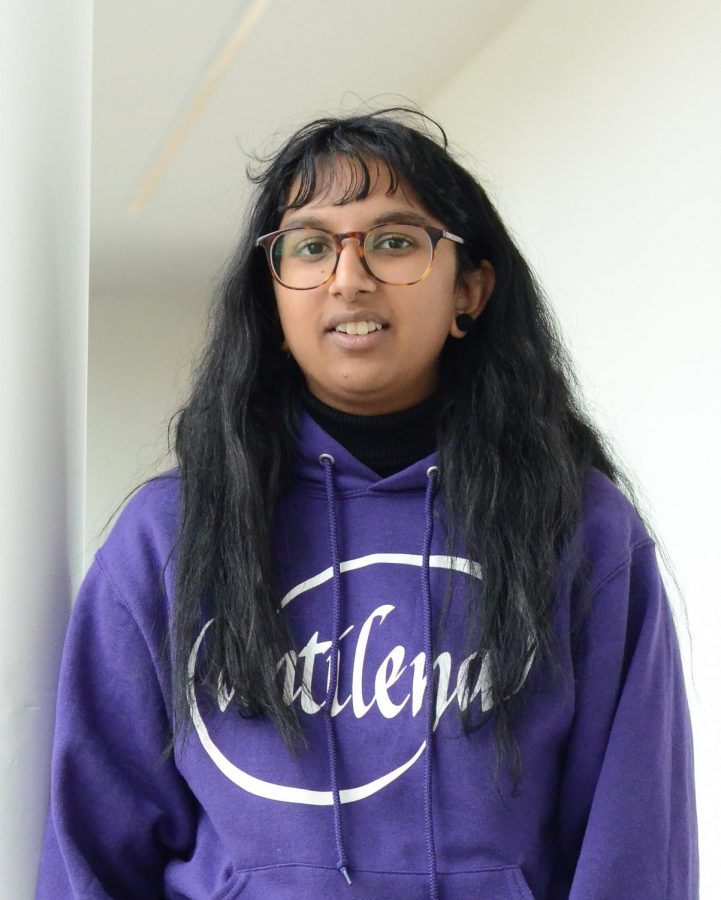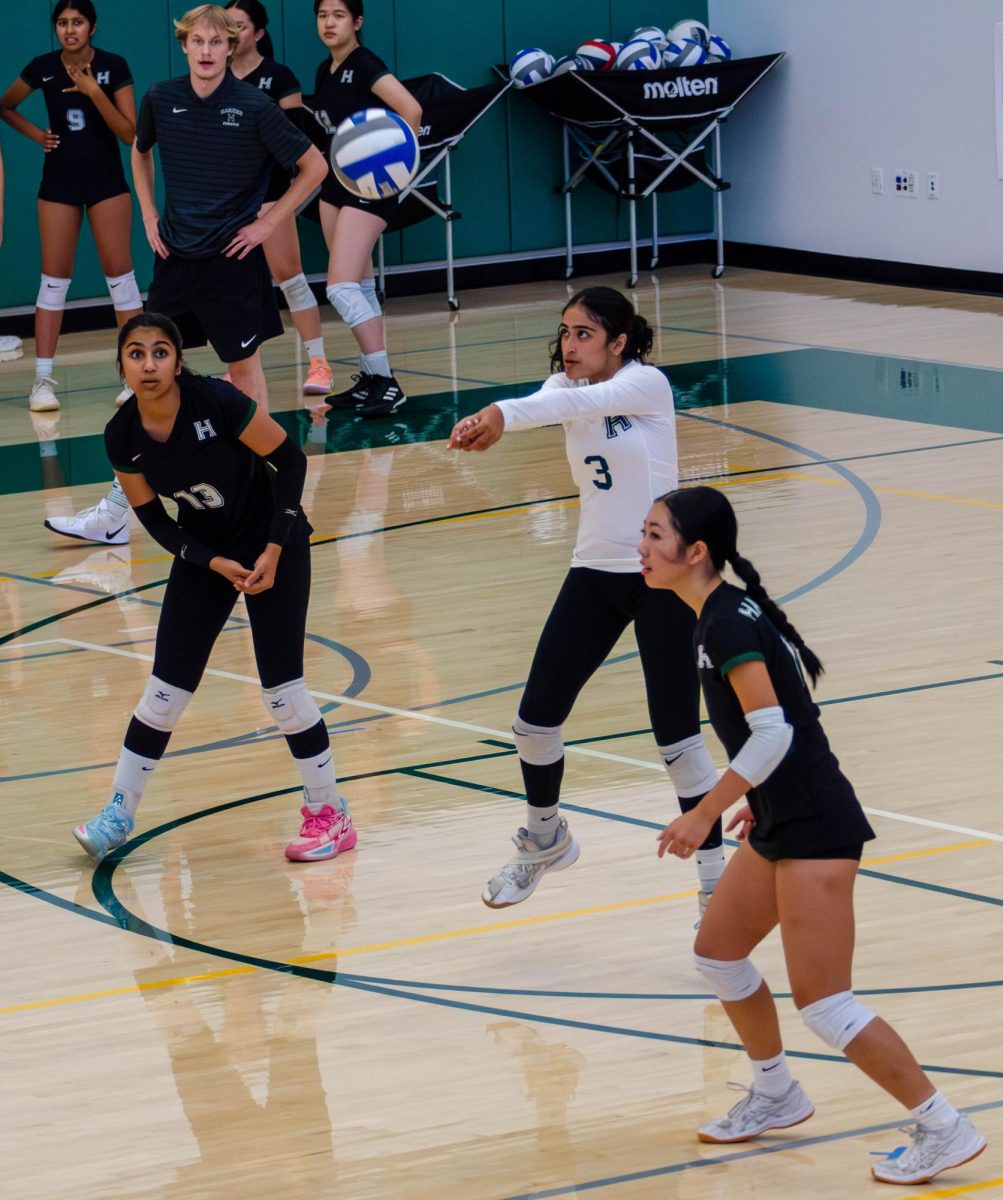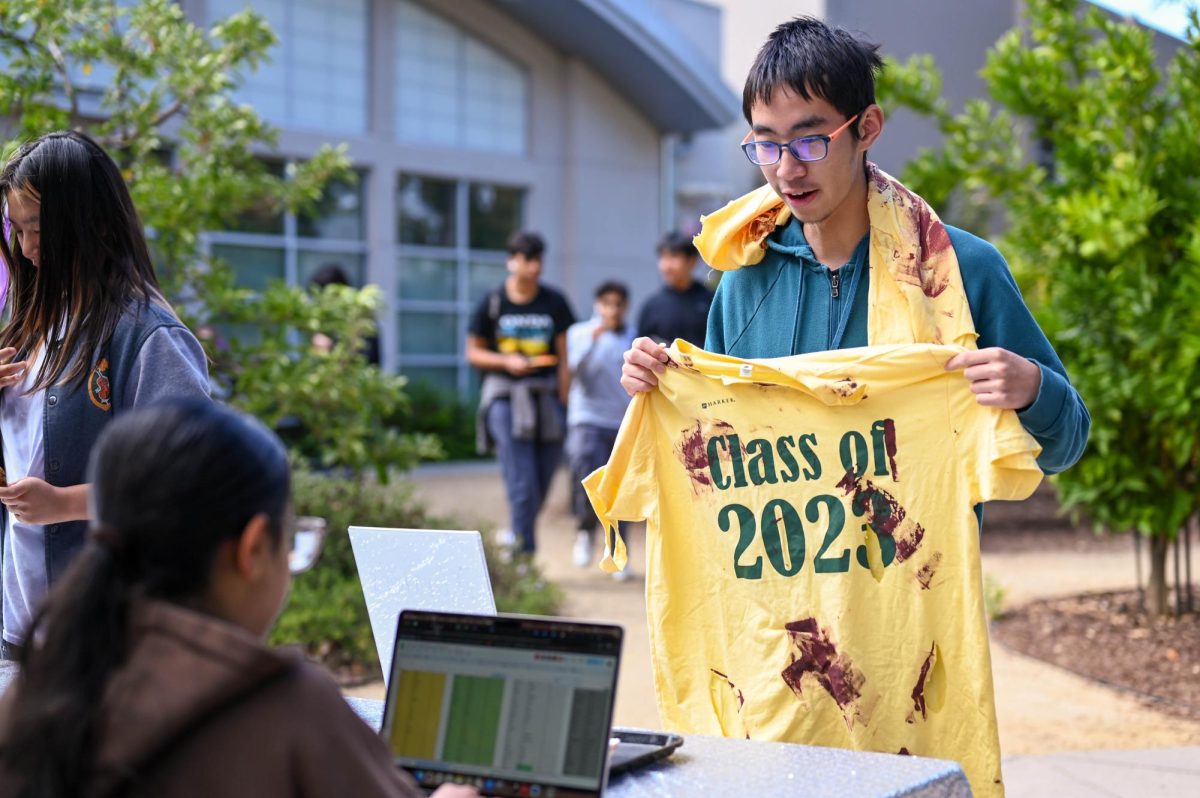Humans of Harker: Jessica Susai finds her place in the chorus of voices
Anoushka Buch
“It’s happened a couple of times where I sang in outside of school choirs, and I didn’t know anyone there, so then I get to know those people through the music, like ‘how are you singing this part,’ or ‘are you crescendoing, what are you doing?’” Jessica Susai (12) said. “With choirs, I feel really good that I can be in this group of people, and we can perform and make others feel something. It’s a feeling of making other people feel the emotions the songs convey. A lot of the time, you can’t really make people feel emotions like that except with an art form like singing.”
March 12, 2018
Everything is silent, and spotlights slowly brighten on a semicircle of young women in matching floor-length dresses. One girl begins to sing, and gradually, others join in until the whole room is alight with the melody, the audience entranced by these women’s voices.
Jessica Susai (12) first began to look up to the Cantilena choir when she started singing in fourth grade, and the Harker singing group was her ultimate goal as a blossoming artist. From the time of her elementary school years to now, Jessica has been constantly expressing herself and growing through her voice by performing constantly in Harker choirs, outside groups, and even just at home for fun.
“I feel really confident when I sing,” she said. “With choirs, I feel really good that I can be in this group of people and perform and make others feel something.”
The unusual sensation the audience receives while viewing a production is bilateral; Jessica experiences a similar emotional rush that comes to her only from performing.
“It’s a feeling of making other people feel the emotions the songs convey,” Jessica said. “You can’t really make people feel emotions like that except with an art form like singing.”
Being part of a team carries a special type of importance to Jessica, something that her friend Maya Kumar (12) has noticed over the years.
“She wants to be part of that group,” Maya said. “She values being in Cantilena for the reason that she gets to be one part of a whole.”
Jessica feels that, over the last eight years, performing with choirs and singing has refined her sense of compassion; she has become adept at understanding another’s struggles, especially when they are communicated through music.
“I can hear music that’s emotional and connect with that person, even if I haven’t gone through something like that,” she said.
While performing in a choir helped Jessica become more apt to understand the emotions and feelings projected by another person, another activity also helped her better feel for the girls around her who were facing similar conflicts: robotics.
Throughout her experience in the last several years in robotics, she learned to fight the subconscious bias that many women in STEM receive. Jessica noticed that many robotics competition judges have a tendency to focus upon the gender of her team even before a competition starts.
“It could be seen as a good thing: they’re just automatically impressed with us,” Jessica said. “But we’ve done nothing to impress them. They hold us to a standard when they know nothing about us.”
Despite the issues that the subconscious bias towards women in STEM raise, the prejudice also fosters empathy and understanding between STEM girls, who have similar experiences in fighting it.
“There is this unspoken thing between girls at STEM events, like ‘I got you,’” Jessica said. “The main thing with the girls we competed with, and generally the women there, was that they always treated us as equals.”
Jessica and her robotics teams have understood how to combat this type of surprise and subconscious bias and level their competitive ground.
“We learned how to get past that, because, after a couple of competitions, the judges and people there got to know us, not as just ‘the girl team,’ but as competitors,” Jessica said.
One of her close companions, Aria Coalson (12), the head of Harker’s robotics team, has noticed Jessica’s ability to overcome these types of struggles by establishing a good rapport with the people around her.
“Jessica was very confident; she really understood that there’s not a difference between girls and guys in robotics,” Aria said. “She led the way so that we all felt confident in our own abilities.”
Though singing and robotics are vastly different activities, their respective environments develop specific character traits, including teamwork and perseverance.
“Over the years, [Jessica] got more and more involved and became a really key component of our team,” Aria said. “She contributed to a lot of designs and the PR aspects. She really found what she was inspired to do.”
Both contributed equally to the development of Jessica’s sense of empathy, something that Sohenee Banerjee (12), a friend who Jessica sings with, has noticed over the years.
“We feel each other on an emotional level,” Sohenee said. “She really understands you. If I’m having a bad day, seeing Jessica makes me happy.”


















![“[Building nerf blasters] became this outlet of creativity for me that hasn't been matched by anything else. The process [of] making a build complete to your desire is such a painstakingly difficult process, but I've had to learn from [the skills needed from] soldering to proper painting. There's so many different options for everything, if you think about it, it exists. The best part is [that] if it doesn't exist, you can build it yourself," Ishaan Parate said.](https://harkeraquila.com/wp-content/uploads/2022/08/DSC_8149-900x604.jpg)




![“When I came into high school, I was ready to be a follower. But DECA was a game changer for me. It helped me overcome my fear of public speaking, and it's played such a major role in who I've become today. To be able to successfully lead a chapter of 150 students, an officer team and be one of the upperclassmen I once really admired is something I'm [really] proud of,” Anvitha Tummala ('21) said.](https://harkeraquila.com/wp-content/uploads/2021/07/Screen-Shot-2021-07-25-at-9.50.05-AM-900x594.png)







![“I think getting up in the morning and having a sense of purpose [is exciting]. I think without a certain amount of drive, life is kind of obsolete and mundane, and I think having that every single day is what makes each day unique and kind of makes life exciting,” Neymika Jain (12) said.](https://harkeraquila.com/wp-content/uploads/2017/06/Screen-Shot-2017-06-03-at-4.54.16-PM.png)








![“My slogan is ‘slow feet, don’t eat, and I’m hungry.’ You need to run fast to get where you are–you aren't going to get those championships if you aren't fast,” Angel Cervantes (12) said. “I want to do well in school on my tests and in track and win championships for my team. I live by that, [and] I can do that anywhere: in the classroom or on the field.”](https://harkeraquila.com/wp-content/uploads/2018/06/DSC5146-900x601.jpg)
![“[Volleyball has] taught me how to fall correctly, and another thing it taught is that you don’t have to be the best at something to be good at it. If you just hit the ball in a smart way, then it still scores points and you’re good at it. You could be a background player and still make a much bigger impact on the team than you would think,” Anya Gert (’20) said.](https://harkeraquila.com/wp-content/uploads/2020/06/AnnaGert_JinTuan_HoHPhotoEdited-600x900.jpeg)

![“I'm not nearly there yet, but [my confidence has] definitely been getting better since I was pretty shy and timid coming into Harker my freshman year. I know that there's a lot of people that are really confident in what they do, and I really admire them. Everyone's so driven and that has really pushed me to kind of try to find my own place in high school and be more confident,” Alyssa Huang (’20) said.](https://harkeraquila.com/wp-content/uploads/2020/06/AlyssaHuang_EmilyChen_HoHPhoto-900x749.jpeg)










